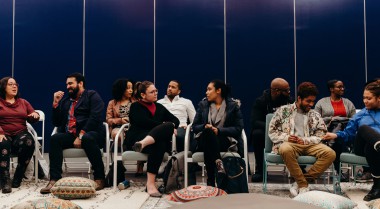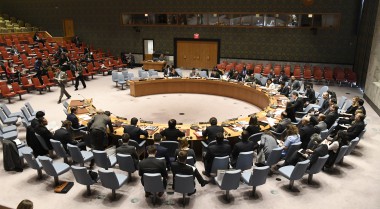
The Peacebuilding Architecture Review
What is the UN Peacebuilding Architecture Review about?
The UN Peacebuilding Architecture aims to support governments and their peoples as they seek to “prevent the outbreak, escalation, continuation, and recurrence of conflict, address root causes, ensure national reconciliation, and move towards recovery, reconstruction, and development” (S/RES/2282, PP8).
The UN Peacebuilding Architecture includes the Peacebuilding Commission (PBC), which consists of the Member States, the Secretary-General’s Peacebuilding Fund (PBF), and the Peacebuilding Support Office (PBSO). Additionally, the Resident Coordinator Offices (RCOs) are responsible for peacebuilding leadership at the country level, and all UN agencies, funds and programmes also have a role to play in this architecture.
The United Nations Peacebuilding Architecture undergoes assessment every five years to evaluate its effectiveness and, starting in 2025, its impact. This is known as the Peacebuilding Architecture Review (PBAR).
Find out why the PBAR matters to local peacebuilders here.
The UN Peacebuilding Architecture Review: Past Progress
In 2015, the UN Peacebuilding Architecture Review (the 2015 PBAR) resulted in coining the term 'sustaining peace', expanding the global understanding of what peacebuilding means across the conflict cycle through the 2016 dual General Assembly-Security Council Resolution (A/RES/70/262-S/RES/2282). The 2016 resolutions further led to the development of the 2018 Report of the UN Secretary-General (S/2018/43), which identified four focus areas and concrete commitments to strengthen the UN's ability to sustain peace across the conflict cycle: operational support and policy coherence, UN leadership, partnerships for peacebuilding; and financing for peacebuilding.
Five years later, the 2020 PBAR assessed the implementation of the UN system's existing work across those four key pillars outlined in the 2018 Report of the Secretary-General on Peacebuilding and Sustaining Peace. During the 2020 PBAR, the PBC highlighted that progress towards implementing sustaining peace needs to be measured in terms of impact rather than outputs. The result: the 2025 PBAR was mandated to focus on the impact of ongoing efforts to build and sustain peace.
How can local peacebuilders get involved in the PBAR?
The PBAR process typically unfolds in two phases: informal and formal
The informal phase focuses on generating discussions about topics to be included in the outcome document, meaning a new resolution outlining the findings, recommendations, and conclusions based on the review and inspiring new initiatives. This phase consists of:
- Consultative processes with think tanks and civil society, their networks and coalitions: Member States and UN entities are encouraged to work with these actors as well as academic institutions, and regional organisations to organise inclusive thematic and regional consultations. These consultations aim to assess progress and propose concrete suggestions for improving the implementation of peacebuilding and sustaining peace.
- For local peacebuilders: You can reach out to Member States, UN partners within the Peacebuilding Architecture and regional organisations to organise these consultations together. Alternatively, you can organise your own discussions but it is important to note that input co-sponsored by government actors is more likely to be considered during the formal phase of negotiations.
- Dialogues with the Panel of Eminent Persons/Independent Experts: During each PBAR, a panel of independent experts is appointed to provide an independent submission that supports the formal stage of the PBAR process. This panel offers insights on the implementation of peacebuilding resolutions to the Secretary-General and Member States, based on consultations with diverse peacebuilding stakeholders. This independent submission can significantly influence how Member States approach the Review (i.e., the 2015 AGE Report coined the term ‘sustaining peace’ later introduced in the 2016 dual resolutions by Member States).
- For local peacebuilders: Consider inviting eminent persons to your 2025 PBAR meetings and consultations to allow them to incorporate your insights into their submissions.
- PBC Meetings: These meetings are open to all Member States and focus on how peacebuilding resolutions are being implemented.
- For local peacebuilders: You can express interest in participating in these discussions by reaching out to your network or partner organisations (like GPPAC) that work closely with the PBC Secretariat in New York to propose your expertise. You can also submit written contributions for consideration by the Member States of the PBC.
The formal phase follows informal discussions. This phase involves an inclusive, intergovernmental review process where Member States will assess the findings and recommendations from the informal phase. In simpler terms, it means that Member States will discuss findings and suggestions from the informal phase. These discussions will help shape a new resolution, which will be presented for adoption by the Security Council and General Assembly. Such resolutions can be substantive (i.e., unpacking peacebuilding and sustaining peace) or procedural (i.e., simply mandating the next PBAR).
If you engage in the PBAR, ensure you collect your insights and recommendations from your meetings and consultations in writing. Written materials will help you reach a broader audience in the follow-up of the consultations. You can 1) engage with governments and donors to incorporate your messages in the PBAR outcome document (a resolution), 2) share your insights with relevant UN partners at the field and global level, and 3) connect with your networks and coalitions (like GPPAC) to work on a dissemination strategy.
Click here for a visualisation of the different phases of the 2025 PBAR.
If you have any questions about the engagement in the PBAR, please reach out to Our UN Liaison Office in New York at un.liaison@gppac.net
→ Click here for GPPAC’s contribution to the 2020 PBAR
→ Click here for GPPAC’s contribution to the 2025 PBAR



